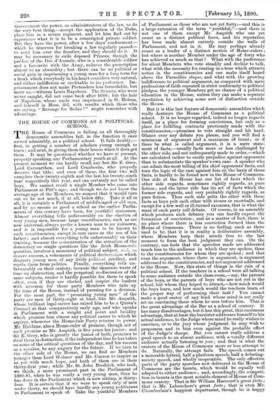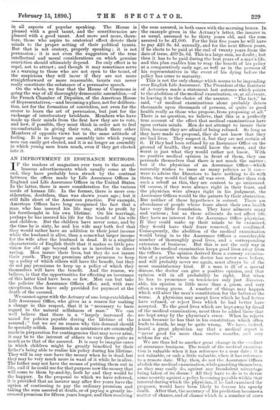THE HOUSE OF COMMONS AS A POLITICAL SCHOOL. T HE House
of Commons is failing, as all thoroughly democratic assemblies fail, in the function it once served admirably, as a political school. It fails doubly,— first, in getting a number of scholars young enough to learn ; and next, in giving them their lesson when it does get them. It may be questioned whether we have at present, properly speaking, any Parliamentary youth at all. At the present moment we can hardly recall any but Sir E. Grey, Lord Carmarthen, and Lord Cranbome, who properly deserve that title ; and even of these, the first two will complete their twenty-eighth and the last his twenty-ninth year respectively this year, and can certainly not be called boys. We cannot recall a, single Member who came into Parliament at Pitt's age ; and though we do not know the average age of the Members, we suspect that it would turn out to be not much, if at all, below fifty. Take it all in all, it is certainly a Parliament of middle-aged or old men, and by no means as good a school as the earlier Parlia- ments of this century have been, for youthful statesmen. Almost everything tells unfavourably on the election of very young men, because large constituencies, such as are now universal, always prefer a known man to an unknown, and it is impossible for a young man to be known to such constituencies, except in rare cases as the son of his father; and almost everything tells unfavourably on their training, because the concentration of the attention of the democracy on single questions like the Irish Home-rule question, involves a monotony of political subject, and, to ensure success, a vehemence of political declamation which disgusts young men of any lively political intellect, and repels them from politics. Finally, everything tells un- favourably on their oratory, because the immense waste of time on obstruction, and the perpetual re-discussion of the same subjects, render it hardly possible for them to speak often, even if they are elected, and inspire the leaders with aversion for those party Members who take up the time of the House, instead of pressing for a division. For the most part, the "promising young men" of the party are men of thirty-eight at least, like Mr. Asquith, whose brilliant legal career has raised him to be a Queen's Counsel at that comparatively early age, and who speaks in Parliament with a weight and point and lucidity which promise him almost any political career to which he aspires, whenever the Home-rule Party returns to power. Mr. Haldane, also a Home-ruler of promise, though not of such promise as Mr. Asquith, is five years his junior ; and Sir E. Grey, who is greatly the junior of both, promises to rival them in distinction, if the independent line he has taken on some of the critical questions of the day, and his success as a speaker, be any augury for the future. If we turn to the other side of the House, we can find no Members younger than Lord Wolmer and Mr. Curzon to inspire us as yet with much hope, and both of them are in their thirty-first year ; while Mr. St. John Brodrick, who took, we think, a more prominent part in the Parliament of 1880-85, when he was really a very young man, than he has done in the Parliament which is now sitting, is thirty- four. It is certain that if we were to speak only of men under thirty, we should. have hardly any young politicians in Parliament to speak of. Take the youthful Members of Parliament as those who are not yet forty,—and this is a large extension of the term "youthful,"—and there is not one of them except Mr. Asquith who can yet count as a distinct political force, and his reputation has been made almost entirely outside the walla of Parliament, and not in it. He may perhaps already count as a leader of a distinct section of Home-rulers ; but where is another Member under the age of forty who has achieved as much as that ? What with the preference for silent Members who vote steadily and decline to talk, what with the necessity for roaring in a tone which attracts notice in the constituencies and can make itself heard above the Parnellite claque, and what with the growing indifference to political argument, as compared. with mere professions of faith repeated in strict conformity to political pledges, the younger Members get no chance of a political education in the House, unless they can make a separate reputation by achieving some sort of distinction outside the House.
But it is this last feature of democratic assemblies which really destroys the House of Commons as a political school. It is no longer regarded, indeed no longer regards itself, as a place for forming convictions, but only as a place for fulfilling contracts previously made with the constituencies,—promises to vote straight and hit hard. Glance over any debate you please, and you will find a minimum of argument and a maximum of taunt ; or if there be what is called argument, it is a mere state- ment of facts,—usually facts more or less challenged by the other side, and not unfrequently made to order,—which are calculated rather to excite prejudice against opponents than to substantiate the speaker's own case. A speaker who can admit the most telling of his chief opponents' facts, and turn the logic of the case against him on the basis of those facts, is hardly to be found now in the House of Commons. One side of the House has one list of facts which the other side regards, sometimes rightly regards, as pure fiction ; and the latter side has its set of facts which the former side regards, and very probably rightly regards, as pure fiction. Thus each side pelts the other with these facts as boys pelt each other with stones or snowballs, and except for a few well or ill-turned sarcasms, that is what the mass of each party call debate. Of course, in an assembly which produces such debates you can hardly expect the formation of conviction ; and as a matter of fact, there is no place where there is less conviction formed than the House of Commons. There is no feeling, such as there used to be, that it is in reality a deliberative assembly, where Members keep their minds free to the last moment to form the best judgment they can. On the contrary, one feels that the speeches made are addressed much less to the audience in which they are spoken, than to the constituencies for whom they are spoken ; and that even the argument, where there is argument, is argument addressed to the constituencies, and not argument addressed to the House. Now, this state of things is the ruin of a political school. If the teachers in a school were all talking to some audience outside the class-room,—say, the parents of the boys, or the parents of boys who are not yet in the school, but whom they hoped to attract,—how much would the boys learn, and how much would the teachers learn of the proper way of performing their task ? You cannot make a good orator of any kind whose mind is not really set on convincing those whom he sees before him. That is the great advantage of the Bar as a school of oratory. It has many disadvantages, but it has this great, this enormous advantage, that at least the barrister addresses himself to his actual audience, to the Judge whose mind he really wishes to convince, or to the jury whose judgment he may wish to prepossess and to bias even against the probable effect of the Judge's charge. But you cannot really address a good speech to an absent audience, with a totally different audience actually listening to you ; and that is what the orators of the House of Commons more or less attempt to do. Naturally, the attempt fails. The speech comes out a miserable hybrid, half a platform speech, half a debating- society speech, and wholly inoperative. The only effective parts of the party speeches now delivered in the House of Commons are the taunts, which would be equally well adapted to either audience ; and, accordingly, the competi- tion in taunts is the most notable element of House of Com- mons oratory. That is Sir William Harcourt's great forte ; that is Mr. Labouchere's great forte ; that is even Mr. Chamberlain's happiest department, though he is happy in all aspects of popular speaking. The House is pleased with a good taunt, and the constituencies are pleased with a good taunt. And more and more, there- fore, those who aspire to oratorical effect devote- their" minds to the proper setting of their political taunts. But that is not oratory, properly speaking ; it is not persuasion ; it is not even the suggestion of the true intellectual and moral considerations on which genuine conviction should ultimately depend. Its only effect is to repel, not to attract; and though it may sometimes serve as a warning to those who are not open to the taunt, of the suspicions they will incur if they are not more straightforward or more reasonable, taunts can never really constitute the substance of a persuasive speech.
On the whole, we fear that the House of Commons is going the way of all thoroughly democratic assemblies,—of the French Chamber of Deputies, of the American House of Representatives,—and becoming a place, not for delibera- tion, not for the formation of conviction, not even for the orator to learn the art of persuasion, but just for the exchange of interlocutory brickbats. Members who have made up their minds from the first how they are to vote, and how, if possible, they must think in order not to feel uncomfortable in giving their vote, attack there other Members of opposite views but in the same attitude of feeling. It is no longer an assembly into which young men can easily get elected, and it is no longer an assembly in which young men learn much, even if they get elected into it.



































 Previous page
Previous page